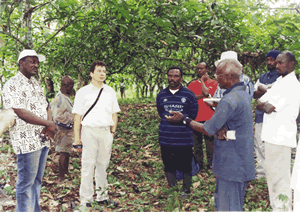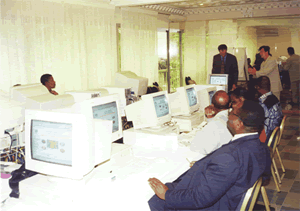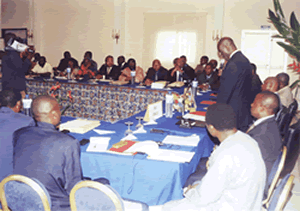Navigation
Cameroon: Farming in the Dark / Camerún: La actividad agrícola en la oscuridad
Poor farmers have little chance of getting a fair price for their produce if they don’t know how much markets beyond their villages are willing to pay. The internet is leveling their playing field through schemes such as INFOSHARE, which is giving access to the latest market news to thousands of remote cocoa and coffee farmers in Cameroon.
Poor farmers have little chance of getting a fair price for their produce if they don’t know how much markets beyond their villages are willing to pay. The internet is leveling their playing field through schemes such as INFOSHARE, which is giving access to the latest market news to thousands of remote cocoa and coffee farmers in Cameroon.
 |
| Needs Assessment of Cocoa and Coffee Farmers |
The Story
Knowledge is power, and lack of knowledge about markets and prices is a key factor in keeping poor farmers around the world “dirt poor.” African producers of cocoa and coffee, for example, earn as little as one twelfth of the international market rate for their crops. In the dark over the prices being realized in local as well as world markets, they remain at the mercy of middlemen, traders and corporations. What is true in Africa, is equally true in Asia or Latin America.
 |
| Training of Cameroonian Partners as regards the Use of UNCTAD Infoshare and Infocomm Tools |
Increasing farmers’ access to knowledge of markets and prices has long been a central plank in efforts to break out of the poverty cycle. It is a strategy now given a massive boost by the opportunities new information technology can provide in helping to bring knowledge to even the remotest farming community. One example of this new potential is a technical assistance project called INFOSHARE, which is giving commodity producers access to the information they need to negotiate better prices and get their produce into higher-paying markets. Cameroon, with about 900,000 cocoa and coffee smallholders, is testing the system and early interest indicates it will expand into other countries and crop sectors as soon as 2006. Villagers without access to the internet will be able to get this information twice daily from national radio broadcasts and use it to set prices that are both fair and realistic. It is estimated that greater market transparency in Cameroon will enable small-scale farmers to increase their returns by 10 to 15 per cent.
 |
| Strengthening of Cameroonian Commodity Information Capacity |
INFOSHARE is run by the UN Conference on Trade and Development (UNCTAD), which has designed this information-sharing database system and has trained government staff in its use. It is part of INFOCOMM, an UNCTAD internet portal that provides, free-of-charge, pricing, product and market information on some 20 commodity sectors. INFOCOMM is currently being used by 12 to 15 million people worldwide, 60 per cent of them in developing countries.
The Context
- When average world commodity prices rise, profits tend to go mostly to large trading companies, not to the small-scale farmers. For example, although in 2003 the prices of cocoa and coffee rose 27 per cent, coffee farmers have seen their share of the take from a package of coffee sold off the supermarket shelf fall from 37 per cent in the early 1990s to between 6 and 8 percent in the new millennium. Cocoa producers get about 7 per cent of the supermarket value.
- Another reason poor farmers don’t profit from price gyrations on the world market is that they must sell at harvest because they can’t afford to stockpile. Any gains go to middlemen and traders.
- Without information on which to base their production, small-scale farmers also have no way to hedge against overproduction. With advance information, they could plant less or attempt to diversify.
- Some agricultural commodity markets are also in disarray as a result of genetically modified strains which disenfranchise poor producers. These strains are now raised in one fourth of the world's cottonfields - up from 2 per cent in 1997. Poor producers and harvesters don’t see a penny from most of these crops because they are planted and managed by cartels.
- Like INFOSHARE, several other projects around the world are helping poor people improve their lives. In rural India, the Infothela is a vehicle resembling a rickshaw which uses a pedal generator to keep an onboard computer running, providing free wireless internet access to people in remote villages. Infothela services include: “human ATMS” -- microfinance corporation employees travel to villages to disburse loans; on-line futures trading, offering predictability to farmers’ sales prices; biometric identification, and remote disbursement of credit to farmers for their warehouse contents. The project is organized by the Indian Institute of Technology.
For further information
UN Conference on Trade and Development (UNCTAD):
Olivier Matringe, Economist, Tel: +41 22 917 5774, E-mail :olivier.matringe@unctad.org
Mehmet Arda, Head, Commodities Branch, Tel: +41 22 917 5790; E-mail: mehmet.arda@unctad.org
Photo credit: UNCTAD / INFOCOMM programme
The www.un.org/events/tenstories and www.un.org.news are solely responsible for the contents of this article. It has not been reviewed by the Horizon Scientific Review Board.
Camerún: La actividad agrícola en la oscuridad
Los agricultores pobres tienen escasas posibilidades de obtener un precio justo por sus productos si no saben los precios que están dispuestos a pagarse en los mercados más allá de sus aldeas. El Internet está nivelando sus terrenos de juego por medio de programas como INFOSHARE, que está dando acceso a las noticias más recientes del mercado a miles de cultivadores de cacao y café que viven en zonas remotas en el Camerún.
Descripción de la situación
El conocimiento es poder y la falta de conocimiento acerca de los mercados y los precios es un factor fundamental para mantener a los agricultores de todo el mundo que cultivan su propia tierra como agricultores pobres. Los productores africanos de cacao y café, por ejemplo, sólo ganan la doceava parte del precio del mercado internacional por sus cultivos. A ciegas de los precios que se están obteniendo en los mercados locales y mundial, siguen estando a merced de los intermediarios, comerciantes y asociaciones de empresas. Lo que es cierto en África, es igualmente cierto en Asia o América Latina.
El aumento del acceso de los agricultores a un conocimiento de los mercados y los precios ha sido desde hace tiempo un principio fundamental en los esfuerzos por romper el círculo de la pobreza. Es actualmente una estrategia a la que se da un impulso masivo gracias a las oportunidades que pueden proporcionar las nuevas tecnologías de la información para contribuir a llevar los conocimientos hasta las comunidades agrícolas más alejadas. Un ejemplo de esta nueva capacidad potencial es un proyecto de asistencia técnica llamado INFOSHARE, que está aportando a los productores de productos básicos acceso a la información que necesitan para negociar mejores precios y llevar sus productos a mercados que pagan precios mayores. El Camerún, con sus 900.000 pequeños cultivadores de cacao y café, está poniendo a prueba el sistema y el rápido interés que ha despertado indica que se extenderá a otros países y sectores de cultivo ya en 2006. Los aldeanos sin acceso a Internet podrán obtener esta información dos veces al día por medio de programas de radio nacionales y utilizarla para establecer precios que sean al mismo tiempo justos y realistas. Se calcula que la mayor transparencia del mercado en el Camerún permitirá a los agricultores en pequeña escala aumentar sus ingresos entre un 10 y un 15 por ciento. INFOSHARE es administrado por la Conferencia sobre Comercio y Desarrollo de las Naciones Unidas (UNCTAD), que ha proyectado este sistema de base de datos de información compartida y que ha instruido a funcionarios públicos en su utilización. Este proyecto forma parte de INFOCOMM, portal de Internet de UNCTAD que proporciona gratuitamente información sobre los precios, los productos y los mercados de unos 20 sectores de productos básicos. INFOCOMM está siendo utilizado actualmente por entre 12 y 15 millones de personas en todo el mundo, el 60 por ciento de las cuales habitan en países en desarrollo.
El contexto
- Cuando los precios mundiales medios de los productos básicos aumentan, los beneficios suelen ir a parar principalmente a grandes sociedades comerciales y no a los pequeños agricultores. Por ejemplo, aunque en 2003 los precios del cacao y el café aumentaron el 27 por ciento, los cultivadores de café han sufrido una reducción de la parte que se llevan del café vendido en los supermercados del 37 por ciento a comienzo de los años noventa a entre el 6 y el 8 por ciento en el nuevo milenio. Los productores de cacao obtienen el 7 por ciento aproximadamente del valor de supermercado.
- Otro motivo por el que los agricultores pobres no se benefician de los movimientos de los precios en el mercado mundial es que deben vender en el momento de la cosecha porque no pueden permitirse guardar reservas. Las ganancias pasan a los intermediarios y comerciantes.
- Sin información que sirva de base a su producción, los pequeños agricultores tampoco tienen forma de protegerse contra la superproducción. Si dispusieran de una información anticipada, podrían plantar menos o tratar de diversificar su producción.
- Algunos mercados de productos básicos agrícolas están también en un estado de desorganización como resultado de variedades modificadas genéticamente que privan de derechos a los productores pobres. Por ejemplo, actualmente se están cultivando nuevas variedades de algodón en la cuarta parte de los campos de algodón del mundo, mientras que en 1997 esas variedades representaban el 2 por ciento. Los productores y los cosechadores pobres no obtienen ni un centavo de la mayoría de estos cultivos debido a que son plantados y administrados por asociaciones de productores.
- Al igual que INFOSHARE, varios otros proyectos de todo el mundo están ayudando a la población pobre a mejorar sus niveles de vida. En la India rural, Infothela es un vehículo semejante a un rickshaw que utiliza un pedal generador para mantener una computadora a bordo en funcionamiento, facilitando un acceso inalámbrico gratuito a Internet a personas que se encuentran en aldeas lejanas. Los servicios de Infothela incluyen: "ATMS humanos", que consisten en que empleados de empresas de microfinanciación se desplazan a aldeas para desembolsar préstamos; el comercio de futuros en línea, que ofrecen previsibilidad con respecto a los precios de las ventas de los agricultores; la identificación biométrica, y desembolsos a distancia de créditos a agricultores por sus productos almacenados. El proyecto está organizado por el Instituto Indio de Tecnología.
PARA MAYOR INFORMACIÓN
Conferencia de las Naciones Unidas sobre Comercio y Desarrollo (UNCTAD):
Olivier Matringe, Economista, Tel: +41 22 917 5774, Correo electrónico:olivier.matringe@unctad.org
Mehmet Arda, Jefe de la sección de productos básicos, Tel: +41 22 917 5790; Correo electrónico: mehmet.arda@unctad.org
The www.un.org/events/tenstories and www.un.org.news are solely responsible for the contents of this article. It has not been reviewed by the Horizon Scientific Review Board.
Photo credit: UNCTAD / INFOCOMM programme
Search
Latest articles
Agriculture
- World Water Week: Healthy ecosystems essential to human health: from coronavirus to malnutrition Online session Wednesday 24 August 17:00-18:20
- World Water Week: Healthy ecosystems essential to human health: from coronavirus to malnutrition Online session Wednesday 24 August 17:00-18:20
Air Pollution
- "Water and Sanitation-Related Diseases and the Changing Environment: Challenges, Interventions, and Preventive Measures" Volume 2 Is Now Available
- Global Innovation Exchange Co-Created by Horizon International, USAID, Bill and Melinda Gates Foundation and Others
Biodiversity
- It is time for international mobilization against climate change
- World Water Week: Healthy ecosystems essential to human health: from coronavirus to malnutrition Online session Wednesday 24 August 17:00-18:20
Desertification
- World Water Week: Healthy ecosystems essential to human health: from coronavirus to malnutrition Online session Wednesday 24 August 17:00-18:20
- UN Food Systems Summit Receives Over 1,200 Ideas to Help Meet Sustainable Development Goals
Endangered Species
- Mangrove Action Project Collaborates to Restore and Preserve Mangrove Ecosystems
- Coral Research in Palau offers a “Glimmer of Hope”
Energy
- Global Innovation Exchange Co-Created by Horizon International, USAID, Bill and Melinda Gates Foundation and Others
- Wildlife Preservation in Southeast Nova Scotia
Exhibits
- Global Innovation Exchange Co-Created by Horizon International, USAID, Bill and Melinda Gates Foundation and Others
- Coral Reefs
Forests
- NASA Satellites Reveal Major Shifts in Global Freshwater Updated June 2020
- Global Innovation Exchange Co-Created by Horizon International, USAID, Bill and Melinda Gates Foundation and Others
Global Climate Change
- It is time for international mobilization against climate change
- It is time for international mobilization against climate change
Global Health
- World Water Week: Healthy ecosystems essential to human health: from coronavirus to malnutrition Online session Wednesday 24 August 17:00-18:20
- More than 400 schoolgirls, family and teachers rescued from Afghanistan by small coalition
Industry
- "Water and Sanitation-Related Diseases and the Changing Environment: Challenges, Interventions, and Preventive Measures" Volume 2 Is Now Available
- Global Innovation Exchange Co-Created by Horizon International, USAID, Bill and Melinda Gates Foundation and Others
Natural Disaster Relief
- STOP ATTACKS ON HEALTH CARE IN UKRAINE
- Global Innovation Exchange Co-Created by Horizon International, USAID, Bill and Melinda Gates Foundation and Others
News and Special Reports
- World Water Week: Healthy ecosystems essential to human health: from coronavirus to malnutrition Online session Wednesday 24 August 17:00-18:20
- STOP ATTACKS ON HEALTH CARE IN UKRAINE
Oceans, Coral Reefs
- World Water Week: Healthy ecosystems essential to human health: from coronavirus to malnutrition Online session Wednesday 24 August 17:00-18:20
- Mangrove Action Project Collaborates to Restore and Preserve Mangrove Ecosystems
Pollution
- Zakaria Ouedraogo of Burkina Faso Produces Film “Nzoue Fiyen: Water Not Drinkable”
- "Water and Sanitation-Related Diseases and the Changing Environment: Challenges, Interventions, and Preventive Measures" Volume 2 Is Now Available
Population
- "Water and Sanitation-Related Diseases and the Changing Environment: Challenges, Interventions, and Preventive Measures" Volume 2 Is Now Available
- "Water and Sanitation-Related Diseases and the Changing Environment: Challenges, Interventions, and Preventive Measures" Volume 2 Is Now Available
Public Health
- Honouring the visionary behind India’s sanitation revolution
- Honouring the visionary behind India’s sanitation revolution
Rivers
- World Water Week: Healthy ecosystems essential to human health: from coronavirus to malnutrition Online session Wednesday 24 August 17:00-18:20
- Mangrove Action Project Collaborates to Restore and Preserve Mangrove Ecosystems
Sanitation
- Honouring the visionary behind India’s sanitation revolution
- Honouring the visionary behind India’s sanitation revolution
Toxic Chemicals
- "Water and Sanitation-Related Diseases and the Changing Environment: Challenges, Interventions, and Preventive Measures" Volume 2 Is Now Available
- Actions to Prevent Polluted Drinking Water in the United States
Transportation
- "Water and Sanitation-Related Diseases and the Changing Environment: Challenges, Interventions, and Preventive Measures" Volume 2 Is Now Available
- Urbanization Provides Opportunities for Transition to a Green Economy, Says New Report
Waste Management
- Honouring the visionary behind India’s sanitation revolution
- Honouring the visionary behind India’s sanitation revolution
Water
- Honouring the visionary behind India’s sanitation revolution
- Honouring the visionary behind India’s sanitation revolution
Water and Sanitation
- Honouring the visionary behind India’s sanitation revolution
- Honouring the visionary behind India’s sanitation revolution

